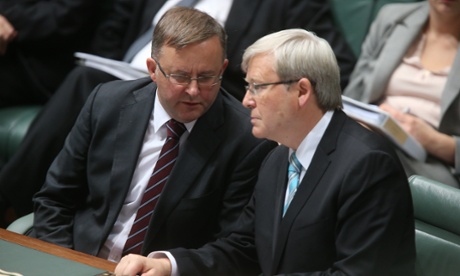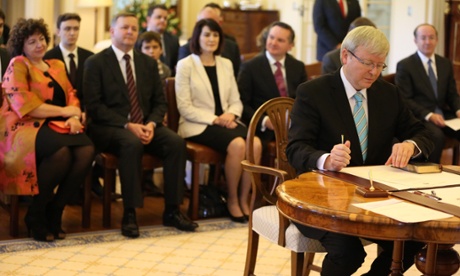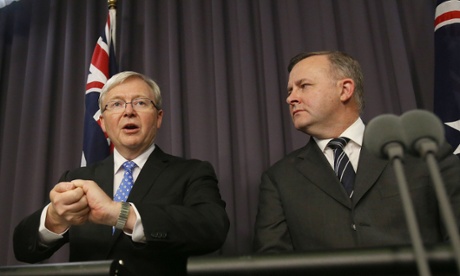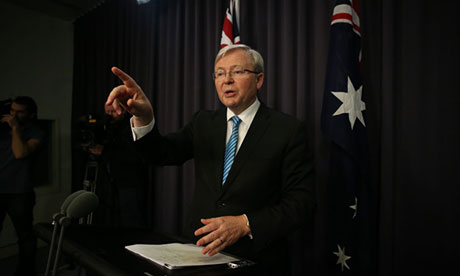Rudd: 'I cannot stand idly by'
Prime minister elect Kevin Rudd and his deputy Anthony Albanese address the media for the first time after the Labor leadership spill. Play Video
More video
Recommended
Kevin Rudd will again be sworn in as Prime Minister by the Governor-General at 9.30am on Thursday after winning the Labor leadership in a ballot against former prime minister Julia Gillard.
In a day of high drama Mr Rudd defeated Ms Gillard 57-45 in a party-room vote, but the switch came with significant political fallout as six ministers resigned, including Treasurer and deputy leader Wayne Swan, who is replaced by the Left's Anthony Albanese as deputy Labor leader and leader of the House of Representatives. The job of Treasurer is likely to go to former immigration minister-turned key Rudd numbers man Chris Bowen.

Off to be sworn in: Prime Minister designate Kevin Rudd leaves his Canberra hotel on Thursday morning. Photo: Andrew Meares
Ms Bryce on Wednesday sought the advice of her solicitor-general as how to proceed with appointing Mr Rudd, after Ms Gillard recommended the governor-general appoint him prime minister.
The Acting Solicitor-General Robert Orr, QC, said Ms Bryce would seek an assurance from Mr Rudd that he would announce his appointment to the House of Representatives ''at the first possible opportunity''.
This would give the lower house the opportunity for ''whatever, if any, action it chooses to take''.

Kevin Rudd: will be sworn in at 930am. Photo: Andrew Meares
Mr Rudd could face his first parliamentary test on Thursday, if the opposition moves a motion of no confidence in the minority government. Should that happen he is likely to get support from crossbenchers Andrew Wilkie, Peter Slipper, Craig Thomson, Bob Katter and Adam Bandt.
Mr Rudd's promotion marks a stunning turnaround for the former prime minister and polling suggests the federal election scheduled for September will be more closely fought.
Addressing reporters in Canberra on Wednesday night, Mr Rudd said he resumed his old job with ''humility, with honour, and with an important sense of energy and purpose''.

Quitting politics: Julia Gillard. Photo: Andrew Meares
The new Labor leader praised Ms Gillard as a ''remarkable reformer'', describing her as a woman of great intelligence, strength and energy.
But Mr Rudd said that in recent years politics had failed the Australian people.
''There has just been too much negativity all round,'' he said.

Facing a new challenge: Tony Abbott. Photo: Andrew Meares
Mr Rudd said he was taking on the challenge of the Labor leadership for a simple reason.
''I simply do not have it in my nature to stand idly by and to allow an Abbott government to come to power in this country by default,'' he said.
Mr Rudd said that his government would work "very closely" with business.

New team: Kevin Rudd and Anthony Albanese. Photo: Andrew Meares
"We have been natural partners in the past, we can be again in the future."
He also had a special word for young people, urging them to re-engage with politics.
"I understand why you have switched off. It is hardly a surprise,” he said. “But I want to ask you to please come back and listen afresh."
 Click for more photos
Click for more photos
Explosive day in Parliament
An emotional Tony Windsor and Rob Oakeshott announced they will not recontest the next election at Parliament House. Photo: Andrew Meares
Ms Gillard will return to the backbench and will leave politics altogether at the election. Her demise brings to an end a tumultuous three years in which she broke through the ultimate glass ceiling, but saw Labor's vote slump to a position where it faced almost certain defeat.
But it has also plunged Labor into more turmoil, with several senior figures resigning in protest and the party showing few signs of being able to present a united front.
Ms Gillard reflected on her role as Australia's first female prime minister, and attributed in part, her political troubles to her gender.
''It doesn't explain everything, it doesn't explain nothing, it explains some things,'' she said.
Ms Gillard congratulated Mr Rudd and visited Governor-General Quentin Bryce late on Wednesday night.
"Three years ago I had the very great honour of being elected as Labor leader ... This privilege was truly humbling," she said.
Ms Gillard said she had faced a minority Parliament and internal division within Labor during her time as Prime Minister.
"It has not been an easy environment to work in," she said.
Ms Gillard also commented about the fact that she has been Australia's first female prime minister.
She said that the reaction to her being the first woman to serve in the position did not explain everything about her prime ministership. But, she said, "it explains some things".
Ms Gillard said she was proud of her government's achievements, nominating the school funding reforms - which passed the Senate on Wednesday, establishing the Royal Commission on Child Abuse, a price on carbon and the introduction of DisabilityCare as highlights.
Finance Minister Penny Wong has become the government's No.3 minister, replacing Communications Minister Stephen Conroy as government leader in the Senate.
Other high profile ministers to go include Climate Change Minister Greg Combet; Trade Minister and Gillard confidant Craig Emerson; Agriculture Minister Joe Ludwig; and School Education Minister Peter Garrett.
In his pitch to colleagues made publicly as he announced his intention to stand, Mr Rudd promised there would be no retribution against Gillard-aligned MPs.
Mr Rudd's return has dramatically redrawn the political landscape, forcing Tony Abbott's Coalition to reset its campaign approach for another, more popular opponent.
Mr Abbott has condemned Labor's leadership change, saying the Australian people deserve better.
He says Kevin Rudd needs to quickly confirm a polling day, preferably before September 14. Mr Abbott says the Australian people should vote for the Coalition if they want strong and stable government.
Ms Gillard's spectacular removal followed a sustained campaign of destabilisation by backers of Mr Rudd which culminated in the circulation of a caucus petition seeking a leadership spill followed by Ms Gillard's decision to call it for 7pm.
Citing the ongoing damage inflicted on her government by three years of disunity since she took over as leader, she eventually yielded to the pressure on the strict condition that whoever lost the contest would agree to leave the parliament at the election.
''We cannot have the government or the Labor Party go to the next election with a person leading the Labor Party and a person floating around as the potential alternate leader,'' she told Sky News just after 4pm.
''In those circumstances I believe anybody who enters the ballot tonight should do it on the following conditions: that if you win, you're Labor leader; that if you lose, you retire from politics.''
She said she had faced a near impossible task effectively taking on two opposition leaders.
''We cannot be in a circumstance … for much of my prime ministership if the truth be told, where I have been in a political contest with the Leader of the Opposition, but I've also been in a political contest with people from my own political party,'' she said. ''No leader should be in that position; certainly no leader should be in that position in the run-up to an election.''
In a hastily convened 5pm press conference in which he took no questions, Mr Rudd advised that he would break his word, take Ms Gillard's deal, and confirm he was a candidate for the leadership.
''The truth is many, many MPs have requested me for a long, long time to contest the leadership of the party, because of the parlous circumstances we now face,'' he said. ''And less politely perhaps, various ministers have been free and frank in their public advice to me as to the desirability of contesting the leadership in recent days. For the nation's sake I believe it's time for this matter to be resolved.''
Mr Rudd's declaration set off furious counting, and prompted the defection of the high-profile Bill Shorten to the Rudd camp. That was seen as an important signal to other MPs and a tacit admission by Mr Shorten that he had erred in moving against Mr Rudd in 2010.
Earlier, Parliament's two most prominent independents, Rob Oakeshott and Tony Windsor, announced their retirements, with neither man recontesting their NSW seats. The pair, who had maintained their support for Ms Gillard, signalled the end of an era of legislative horse-trading which had sat uncomfortably with many voters, despite its virtues.
While Mr Rudd will not enjoy a parliamentary majority either, he has already received expressions of support from four of the seven independents and needs just one more to remove the danger of losing a no-confidence vote in the House of Representatives.
with Judith Ireland and AAP








 Kevin Rudd, left, and new deputy Anthony Albanese after winning the leadership spill Photograph: Gary Ramage/Newspix/Rex Featur
Kevin Rudd, left, and new deputy Anthony Albanese after winning the leadership spill Photograph: Gary Ramage/Newspix/Rex Featur











 Click to play video
Click to play video Click to play video
Click to play video Click to play video
Click to play video Click to play video
Click to play video Click to play video
Click to play video





